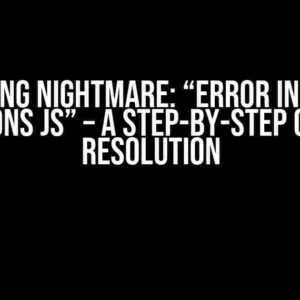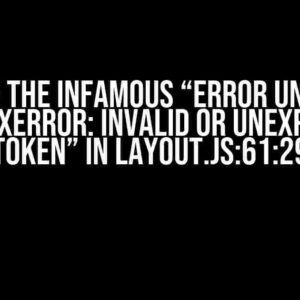Are you tired of dealing with pesky null values in your jOOQ INSERT operations? Do you struggle to convert Optional<String> to a fixed UUID value when nulls are present? Worry no more! This comprehensive guide will walk you through the process of tackling this common challenge with ease and finesse.
Understanding the Problem: Optional<String> and Null Values
In jOOQ, when dealing with Optional<String> values, it’s not uncommon to encounter null values. These null values can cause headaches during INSERT operations, as they may not be compatible with the desired UUID data type. To overcome this obstacle, we need to find a way to convert these Optional<String> values to a fixed UUID value when nulls are present.
Why Do We Need to Handle Null Values?
Null values can lead to several issues, including:
- Data inconsistencies: Null values can result in incomplete or incorrect data, which can have severe consequences in various applications.
- Database errors: Null values may not be compatible with certain data types, causing errors during INSERT operations.
- Data loss: If not handled properly, null values can lead to data loss, compromising the integrity of your database.
The Solution: Converting Optional<String> to a Fixed UUID Value
To convert Optional<String> values to a fixed UUID value when nulls are present, we’ll utilize jOOQ’s powerful API and a dash of creativity.
Step 1: Import the Necessary Dependencies
import org.jooq.DSLContext;
import org.jooq.InsertQuery;
import org.jooq.Record;
import org.jooq.Result;
import org.jooq.immutable.tables.references.MY_TABLE;
import java.util.Optional;
import java.util.UUID;
Step 2: Define the UUID Value for Nulls
Let’s define a fixed UUID value that we’ll use as a replacement for nulls. You can choose any valid UUID value, but for this example, we’ll use a simple one:
private static final UUID NULL_UUID = UUID.fromString("00000000-0000-0000-0000-000000000001");
Step 3: Create a Custom Converter Function
Create a custom converter function that takes an Optional<String> value as input and returns a UUID value. This function will handle null values by returning the fixed UUID value defined earlier:
private static UUID convertOptionalStringToUUID(Optional<String> optionalString) {
return optionalString.isPresent() ? UUID.fromString(optionalString.get()) : NULL_UUID;
}
Step 4: Use the Converter Function in Your jOOQ INSERT Operation
Now, let’s integrate the custom converter function into your jOOQ INSERT operation. Assume you have a MY_TABLE table with a UUID column named UUID_COLUMN:
DSLContext ctx = DSL.using(connection, dialect);
InsertQuery<Record> insertQuery = ctx.insertQuery(MY_TABLE);
insertQuery.addValue(MY_TABLE.UUID_COLUMN, convertOptionalStringToUUID(optionalStringValue));
insertQuery.execute();
In this example, we’re using the custom converter function to convert the Optional<String> value (optionalStringValue) to a UUID value before inserting it into the UUID_COLUMN.
Example Scenarios and Edge Cases
To further illustrate the solution, let’s explore some example scenarios and edge cases:
Scenario 1: Non-Null Optional<String> Value
In this scenario, the Optional<String> value is not null, and we can convert it to a valid UUID value:
Optional<String> optionalStringValue = Optional.of("12345678-1234-1234-1234-123456789012");
UUID uuidValue = convertOptionalStringToUUID(optionalStringValue);
// uuidValue will be a valid UUID: 12345678-1234-1234-1234-123456789012
Scenario 2: Null Optional<String> Value
In this scenario, the Optional<String> value is null, and we’ll use the fixed UUID value for nulls:
Optional<String> optionalStringValue = Optional.empty();
UUID uuidValue = convertOptionalStringToUUID(optionalStringValue);
// uuidValue will be the fixed UUID value for nulls: 00000000-0000-0000-0000-000000000001
Edge Case: Invalid UUID String
What happens if the Optional<String> value contains an invalid UUID string? In this case, we’ll catch the exception and return the fixed UUID value for nulls:
Optional<String> optionalStringValue = Optional.of("invalid-uuid-string");
try {
UUID uuidValue = convertOptionalStringToUUID(optionalStringValue);
// This will throw an exception
} catch (IllegalArgumentException e) {
// Return the fixed UUID value for nulls
UUID uuidValue = NULL_UUID;
}
Conclusion
And there you have it! With these simple steps, you’ve successfully converted Optional<String> to a fixed UUID value for nulls in jOOQ during INSERT operations. By using a custom converter function, you can ensure data consistency and prevent null values from causing issues in your database.
Remember, mastering jOOQ requires creativity, patience, and practice. With this guide, you’re one step closer to becoming a jOOQ expert. Happy coding!
| Keyword | Explanation |
|---|---|
| Optional<String> | A container that may or may not contain a non-null value. |
| UUID | A universally unique identifier, often used as a primary key in databases. |
| jOOQ | A popular Java library for working with databases, providing a SQL-like API. |
Frequently Asked Question
Want to know the secret to converting those pesky Optional
What’s the purpose of converting Optional to a fixed UUID value?
Converting Optional
How do I convert Optional to a fixed UUID value using jOOQ’s coalesce function?
You can use jOOQ’s coalesce function to convert OptionalDSL.coalesce(yourOptionalString, DSL.inline(UUID.fromString("your-default-UUID")));. This will return the original value if it’s not null, and the default UUID value if it is null.
Can I use jOOQ’s nvL function instead of coalesce?
Yes, you can use jOOQ’s nvL function as an alternative to coalesce. The nvL function is similar to coalesce, but it’s specifically designed for working with null values. For example: DSL.nvl(yourOptionalString, DSL.inline(UUID.fromString("your-default-UUID")));. Both coalesce and nvL functions can be used to achieve the same result.
How do I implement this conversion in a jOOQ INSERT operation?
To implement the conversion in a jOOQ INSERT operation, you can use the converted value as a parameter in your insert query. For example: insertInto(YOUR_TABLE).set(YOUR_COLUMN, DSL.coalesce(yourOptionalString, DSL.inline(UUID.fromString("your-default-UUID")))).execute();. This will insert the converted value into the specified column.
What are the benefits of using a fixed UUID value for null entries?
Using a fixed UUID value for null entries provides several benefits, including improved data consistency, easier data analysis, and enhanced data integrity. By assigning a default value, you can avoid null pointer exceptions, simplify data processing, and ensure that your database remains clean and organized.



